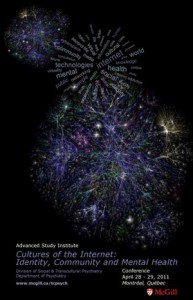 Hace una semana participé como ponente en la Conferencia: “Cultures of the Internet” (Culturas del Internet) organizada durante el Instituto de Estudios Avanzados 2011 del departamento de Psiquiatría Transcultural de McGill University.
Hace una semana participé como ponente en la Conferencia: “Cultures of the Internet” (Culturas del Internet) organizada durante el Instituto de Estudios Avanzados 2011 del departamento de Psiquiatría Transcultural de McGill University.
Presenté un paper titulado: “Todos somos dateros: Estrategias participativas basadas en Internet para fortalecer la ciudadanía, promover la salud y la calidad de vida en el Perú. Utilizé a Todos Somos Dateros como caso de estudio para sugerir como las tecnologías de “crowdsourcing” podrían ser utilizadas en diversos contextos de salud pública. Traté de demostrar como el uso de estas tecnologías han empezado a trastocar nociones convecionales de Traducción de Conocimiento y la manera en como concebimos de los Sistemas de Conocimiento en Salud. Abajo incluyo el Abstract en inglés:
“Todos somos dateros” (We are all data-providers): Internet-based participatory strategies to strengthen citizenship, promote health and quality of life in Peru
How can web-based crowdsourcing technologies provide new opportunities for civic engagement in the design, implementation and evaluation of public policies and programs related to health and quality of life? This paper presents “Todos Somos Dateros” (TSD) as a case study of a crowdsourcing model concerned with improving civic engagement on urban mobility issues in Lima, Peru. The experience of TSD can provide a number of preliminary lessons that can inform the implementation of crowdsourcing strategies aimed at other public issues, like mental and environmental health. Recent experiences with crowdsourcing suggest that these technologies and the information and relationships they produce, challenge the way we traditionally conceive of “evidence-based” actions, knowledge-to-action pathways, accountability, and governance issues, to name only a few dimensions for further study. More importantly, these experiences suggest that crowdsourcing technologies are powerful social-capital and collective-action generating technologies, a potential that could be capitalized by public health projects and initiatives around the globe.